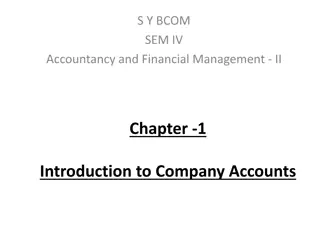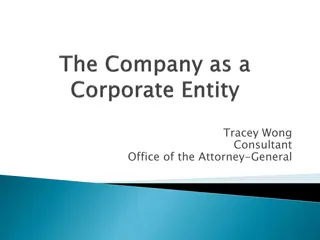Understanding Debentures and Charges in Company Law
Debentures play a significant role in company law, representing various types of securities issued by a company. They are defined under the Companies Act and have specific characteristics, such as being under common seal, repayment terms, interest payments, and charges on movable property. Debenture
0 views • 21 slides
Overview of Company Accounts and Share Issuance
This chapter introduces fundamental concepts related to company accounts, including types of companies, share capital, reserves, debentures, and more. It covers topics like share issuance methods, debenture types, and membership structures of companies. Understanding these concepts is crucial for gr
0 views • 50 slides
Managing Foreign Exchange Rate Risk in Infrastructure Investments: Case Studies
Explore how CELSE tackled foreign exchange rate risk in its LNG power plant project in Brazil through innovative financing strategies involving local debentures, project bonds, and international investors. The project was a joint venture between Golar Power and EBrasil, with significant involvement
0 views • 35 slides
Understanding Underwriting of Shares & Debentures by Bhoomika Garg
Underwriting involves a contract between a company and underwriters who commit to take up unsold shares or debentures. Types of underwriting include full, partial, and firm underwriting. Underwriters receive underwriting commissions as per the Companies Act, 2013.
0 views • 21 slides
Understanding Capital Market and Its Significance
Capital market refers to the market for long-term finance where financial assets like Shares, Debentures, and Bonds are traded. It plays a vital role in mobilizing funds for companies and governments, facilitating capital formation, and promoting economic growth. The classification includes Industri
0 views • 11 slides
Private Placement of Securities: Overview and Methods to Raise Capital
Private placement of securities involves offering securities to a select group of investors by a company, excluding public offering. This presentation covers the meaning of private placement, provisions of law, methods to raise capital through private placement, and understanding the Private Placeme
3 views • 16 slides
Understanding Investment Accounts and Transactions in Financial Accounting
Investment accounts involve transactions such as purchasing and selling bonds, debentures, and stocks, with considerations for interest payments, market prices, and accrued interest. Differentiating between Ex-Interest and Cum-Interest transactions is crucial in determining the capital cost of inves
0 views • 7 slides
Overview of Company Law: Incorporation, Corporate Veil, and Legal Entities
Discover the fundamentals of company law, including the formation and regulation of companies, corporate veil protection, limited liability, and the powers granted to companies. Gain insights into the separate legal entity status, transferability of interests, and the ability of companies to sue and
0 views • 19 slides
Understanding Dividend Income, Trade, Business, and Professions
Dividend income is a share of profits distributed by a company to its shareholders in the form of money, shares, debentures, or other securities. Dividends are subject to tax, with resident companies typically paying a 10% tax on gross dividends. Certain exemptions apply for specific entities and si
0 views • 22 slides
Difference Between Capital Market and Money Market: A Comprehensive Overview
The capital market and money market serve different purposes in the financial world. While the capital market provides funds for long-term investments in securities like stocks and debentures, the money market deals with short-term borrowing and lending of funds. The capital market acts as a middlem
0 views • 4 slides









